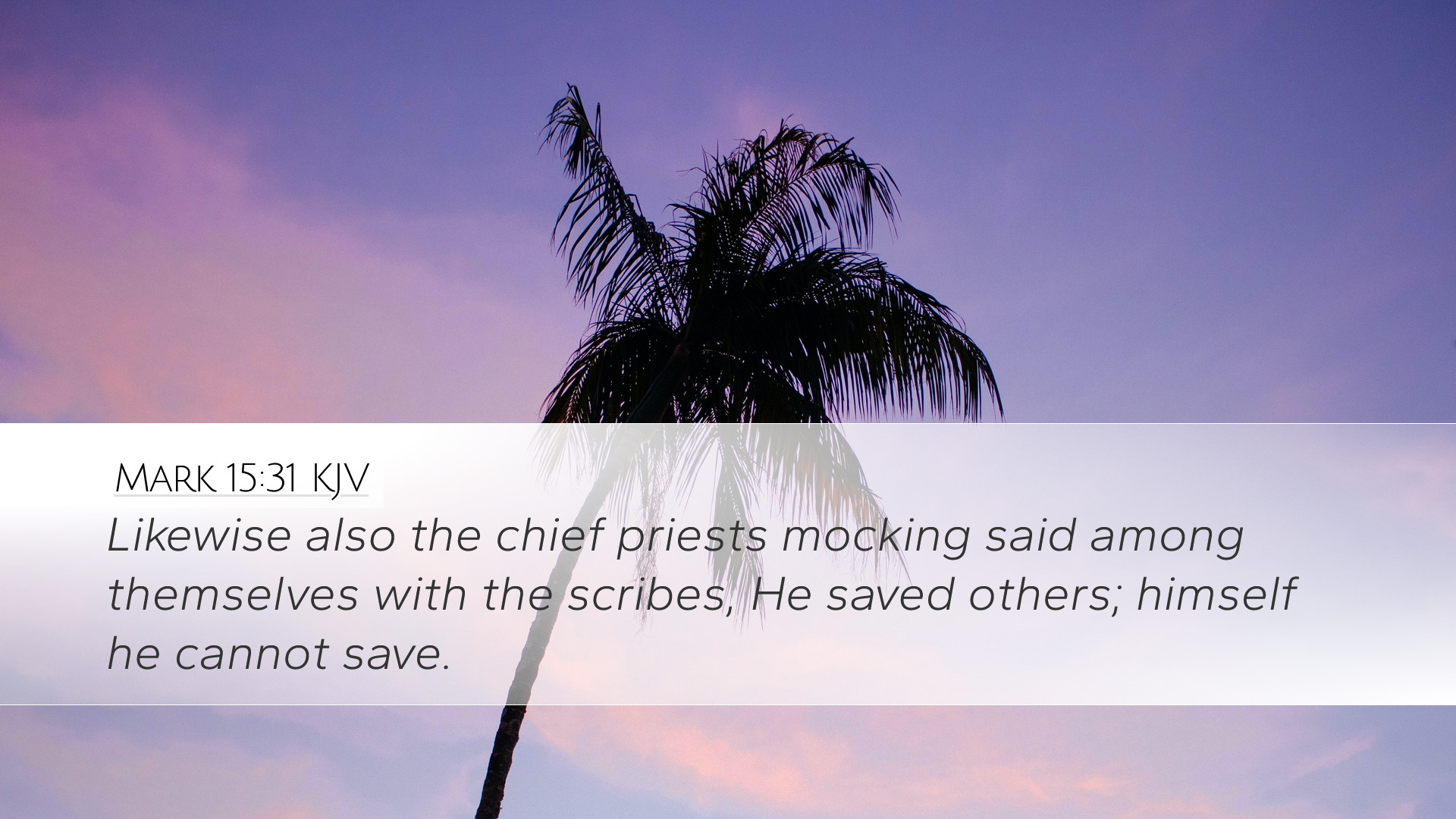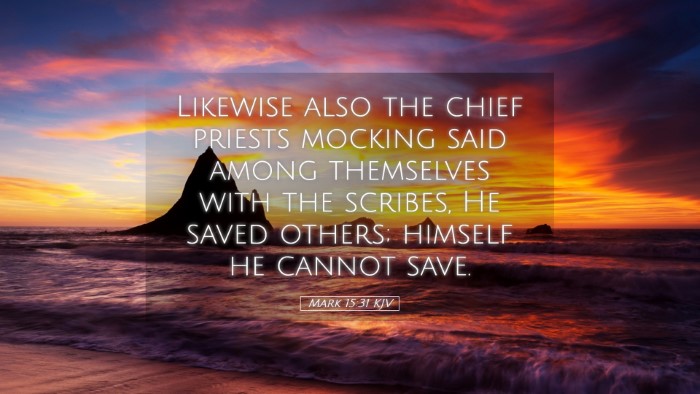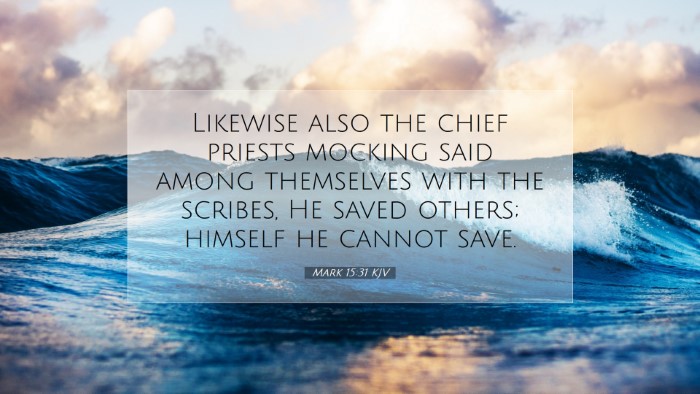Commentary on Mark 15:31
Verse Overview: Mark 15:31 states, "Likewise also the chief priests mocking said among themselves with the scribes, He saved others; himself he cannot save." This verse forms part of the profound account of the crucifixion of Jesus, where mockery and incredulity converge at the foot of the cross.
Contextual Background
In this moment of derision, the religious leaders encapsulate the sentiments swirling around the crucifixion. They view the events through a lens of disdain, amplifying their mockery of Jesus and revealing the spiritual blindness that characterized their opposition to Him. This moment is pivotal in understanding both the historical and theological implications of Christ's sacrifice.
Insights from Public Domain Commentaries
Matthew Henry's Commentary
Matthew Henry emphasizes the irony in the chief priests' words. They acknowledge that Jesus, who had performed miracles, claimed to save others but in their mockery, they highlight the tragedy of the moment: "He saved others; himself he cannot save." Henry points out that this statement, while a mockery, reveals a deeper truth about the nature of Christ's mission—He willingly chose not to save Himself in order to save humanity from sin.
- Pride and Hypocrisy: Henry notes the prideful attitude of the religious leaders. They are simultaneously acknowledging Jesus' power while denying its significance, a behavior characteristic of hypocritical hearts.
- Theological Reflection: The commentary encourages readers to reflect on the necessity of Christ's sacrifice. The mocking highlights the gravity of sin; Jesus' choice to remain on the cross was an act of love and obedience to the Father's will, revealing the greater plan of redemption.
Albert Barnes' Notes on the Bible
Albert Barnes provides a detailed exposition of the scene depicted in Mark 15:31. He notes that the chief priests and scribes used their position to belittle Jesus, showing their commitment to discrediting Him publicly. Barnes points out that their mockery stemmed from a misunderstanding of Jesus’ mission. They expected a political savior who would liberate them from Roman oppression, not a spiritual redeemer offering eternal salvation.
- Mockery as a Sign of Defeat: Barnes argues that the ridicule of the religious leaders exemplifies their failure to recognize the real power of Jesus Christ. Their jeers attempt to undermine His authority but ironically affirm His identity as the Savior.
- Public Perception: Commenting on the influence of leaders, Barnes highlights how public mockery served to galvanize the crowds against Jesus, illustrating the volatile intersection of faith and politics during that era.
Adam Clarke's Commentary
Adam Clarke's insights underscore the theological implications of the chief priests' mockery. Clarke remarks on the irony that those who intended to belittle Jesus inadvertently mentioned a crucial truth—Jesus' capacity to save. He emphasizes that their statements were laced with unintended prophecy about the nature of Jesus' sacrifice.
- Rejection of Truth: Clarke points out that the leaders' inability to see Jesus as the Messiah reflects a broader spiritual blindness. Their mockery serves as a profound reminder of the rejection of divine truths by those entrusted with spiritual guidance.
- The Greater Plan of Salvation: Clarke explains that the refusal to acknowledge Jesus' power confirms the necessity of His death. He emphasizes that Christ’s refusal to save Himself was not a sign of weakness but a demonstration of His commitment to fulfilling God's plan of salvation.
Theological Applications
Mark 15:31 encourages deep reflection on the nature of true leadership and discipleship. The mockery directed at Jesus serves as a stark reminder of the world's rejection of Christ and the costly nature of following Him. As pastors and scholars interpret this verse, it calls for several applications:
- Understanding Suffering: This passage invites believers to grasp the paradox of strength in suffering. Jesus' choice to endure ridicule for the sake of salvation challenges our notions of power and success.
- The Role of Faith Leaders: The behavior of the chief priests serves as a warning against prideful leadership. It prompts a self-examination among leaders regarding their role in pointing others to Christ versus seeking their own glory.
- The Call to be Counter-Cultural: Believers are encouraged to stand firm in their faith, even amidst mockery and disdain. The passage teaches the importance of resilience in faith, as Jesus modeled a response to ridicule through obedience to His mission.
Conclusion
Mark 15:31 lays bare the tension between Christ's divine mission and the fallen human condition. Through the mockery of the chief priests, the hypocrisy and ignorance of the leaders starkly contrast with the profound truth of Christ’s identity and purpose. For pastors, students, and theologians, this verse serves not merely as a historical account but as a rich source of theological insight, encouraging a deeper understanding of sacrifice, redemption, and the unwavering love of God for humanity.


